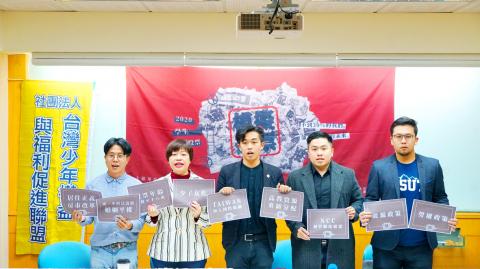The National Students’ Union of Taiwan (NSUT) yesterday launched an online mock election for students ahead of the Jan. 11 presidential and legislative elections.
The mock election was co-organized by groups including the Taiwan Youth Association for Democracy and the Taiwan Alliance for Advancement of Youth Rights and Welfare, as well as 35 university student unions, said the union, which was founded in April.
Online voting was scheduled to open to holders of student identification cards from senior-high schools, vocational high schools and universities at 8:20pm last night, it said.

Photo courtesy of the National Students’ Union of Taiwan
Students would be able to vote for a presidential candidate and a political party through a messenger chatbot linked to the union’s and the alliance’s Facebook pages, it added.
Online voting is to close at 8:20pm on Sunday, and the results are to be announced at 10am on Monday, it said.
Earlier this month, organizers sent out multiple-choice questionnaires to all presidential and legislative candidates, as well as political parties, union president Tan Ko-him (陳佑維) said.
The survey asked their stance on 10 topics, including a proposal to lower the minimum voting age to 18, marriage equality and labor policy, he said, adding that responses would be posted online.
Students without voting rights or who cannot return to the places where they are registered to vote make up less than 30 percent of Taiwan’s voting age population, Tan said.
However, they are to bear “100 percent of the future fate of Taiwan,” he added.
Historically, the turnout among young voters has always been relatively low, association secretary-general Alvin Chang (張育萌) said.
Statistics show that the voter turnout among 20-to-35-year-olds in the elections held between 2008 and 2016 was about 50 to 60 percent, while turnout among voters aged 65 and older is about 80 to 90 percent, he said.
Chang cited a higher overlap between the legal and actual residences of middle-aged and older voters as a reason for their higher turnout.
Taiwan’s electoral system is “unfair to young people,” he said, adding that many young voters are unable to travel back to their hometowns during elections because of financial constraints.
About 1.18 million people would be able to vote for the first time next month, he said, citing Central Election Commission data.
“Can 1.18 million voters sway the results of an election? I believe we all have an answer in our hearts,” he added.

Taiwan is stepping up plans to create self-sufficient supply chains for combat drones and increase foreign orders from the US to counter China’s numerical superiority, a defense official said on Saturday. Commenting on condition of anonymity, the official said the nation’s armed forces are in agreement with US Admiral Samuel Paparo’s assessment that Taiwan’s military must be prepared to turn the nation’s waters into a “hellscape” for the Chinese People’s Liberation Army (PLA). Paparo, the commander of the US Indo-Pacific Command, reiterated the concept during a Congressional hearing in Washington on Wednesday. He first coined the term in a security conference last

Prosecutors today declined to say who was questioned regarding alleged forgery on petitions to recall Democratic Progressive Party (DPP) legislators, after Chinese-language media earlier reported that members of the Chinese Nationalist Party (KMT) Youth League were brought in for questioning. The Ministry of Justice Investigation Bureau confirmed that two people had been questioned, but did not disclose any further information about the ongoing investigation. KMT Youth League members Lee Hsiao-liang (李孝亮) and Liu Szu-yin (劉思吟) — who are leading the effort to recall DPP caucus chief executive Rosalia Wu (吳思瑤) and Legislator Wu Pei-yi (吳沛憶) — both posted on Facebook saying: “I

The Ministry of Economic Affairs has fined Taobao NT$1.2 million (US$36,912) for advertisements that exceed its approved business scope, requiring the Chinese e-commerce platform to make corrections in the first half of this year or its license may be revoked. Lawmakers have called for stricter enforcement of Chinese e-commerce platforms and measures to prevent China from laundering its goods through Taiwan in response to US President Donald Trump’s heavy tariffs on China. The Legislative Yuan’s Finance Committee met today to discuss policies to prevent China from dumping goods in Taiwan, inviting government agencies to report. Democratic Progressive Party Legislator Kuo Kuo-wen (郭國文) said

The Ministry of Economic Affairs has fined Taobao NT$1.2 million (US$36,900) for advertisements that exceeded its approved business scope and ordered the Chinese e-commerce platform to make corrections in the first half of this year or its license would be revoked. Lawmakers have called for stricter supervision of Chinese e-commerce platforms and more stringent measures to prevent China from laundering its goods through Taiwan as US President Donald Trump’s administration cracks down on origin laundering. The legislature’s Finance Committee yesterday met to discuss policies to prevent China from dumping goods in Taiwan, inviting government agencies to report on the matter. Democratic Progressive Party